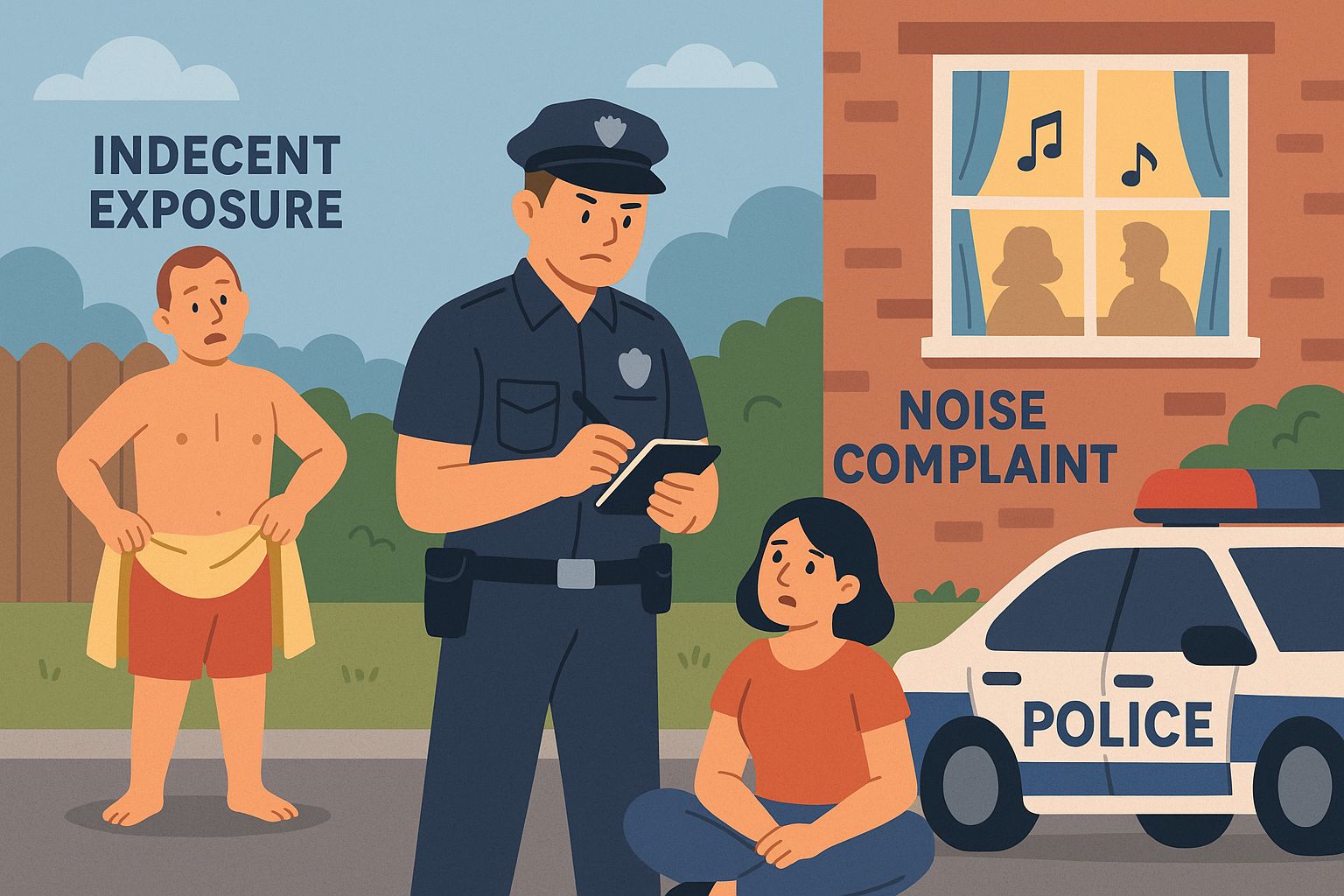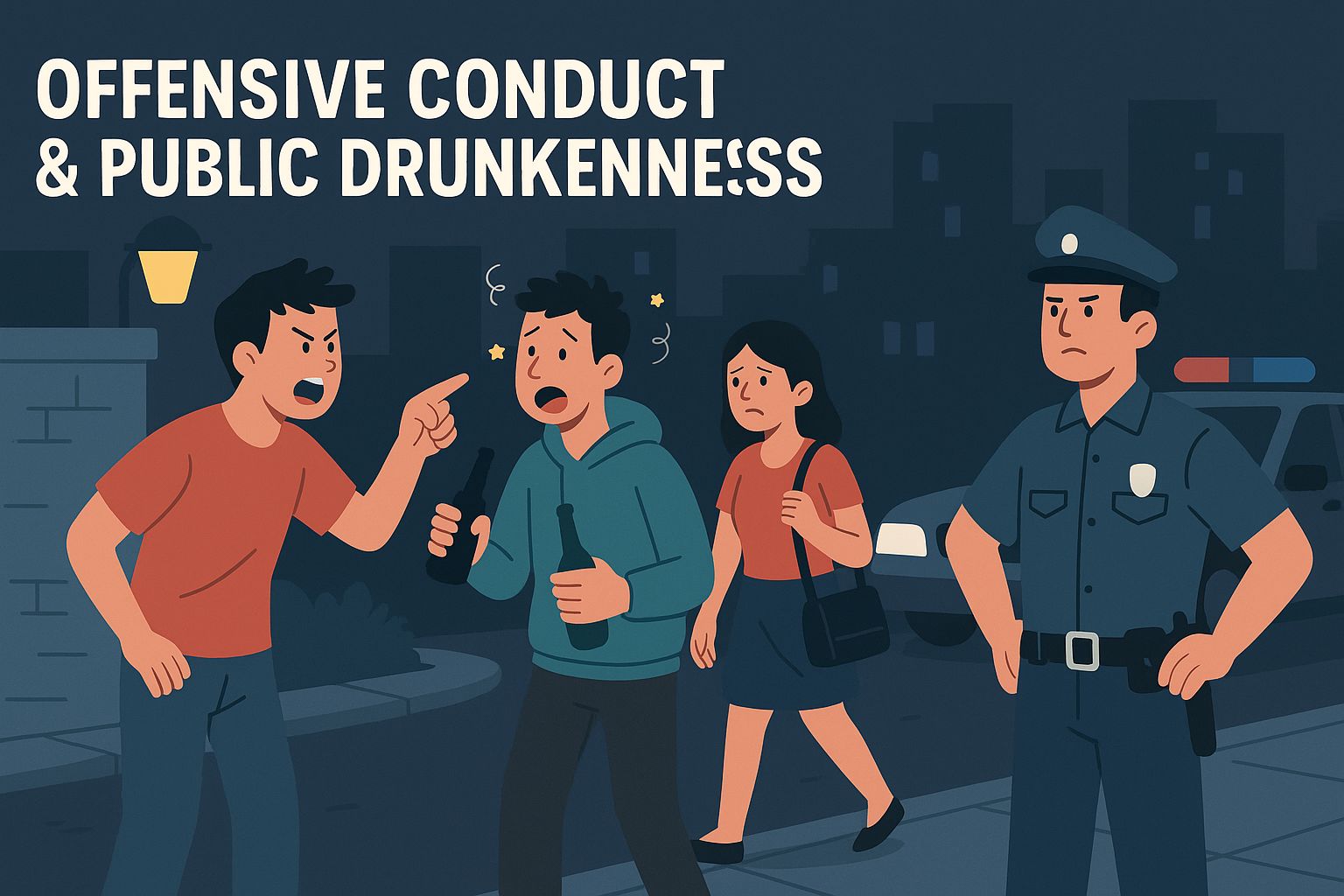Common Habits, Serious Crimes: A Newcomer's Guide to Public Order Offences in Australia

Key Takeaways
Public Behaviour is Regulated: Actions that disturb the peace, even if considered minor elsewhere, can be treated as criminal offences in Australia.
The "Reasonable Person" Test: The key legal test for many public order offences is whether an objective, "reasonable person" would find the conduct offensive, threatening, or indecent in the circumstances.
Common Offences: Key offences include offensive conduct/language, being drunk and disorderly, indecent exposure, and causing a serious public nuisance.
Consequences Can Be Serious: While often dealt with by a fine, these offences can lead to a court summons and result in a criminal record, which can impact visas, travel, and employment.
Introduction
For many newcomers to Australia, especially international students, some habits from back home can lead to unexpected trouble. A night out drinking with friends that gets a bit loud might not be a big deal in your home country, where no one would call the authorities. Here, however, it could lead to a police intervention. Similarly, a simple assumption about beach etiquette, like going topless, could result in a charge if it's not a designated clothing-optional beach.
We've had many readers contact us after our articles on what to do if arrested or police search powers, surprised that these everyday situations fall under criminal law. They absolutely do. This is the core reason we, as legal professionals, write these guides: to explain that these "small" lifestyle differences can sometimes cross the line into what Australian law calls Public Order Offences.
Important Note: Public order offences are governed by state and territory legislation. This article uses the law in New South Wales (NSW), primarily the Summary Offences Act 1988, as a guiding example. The laws and penalties in other states like Victoria are similar but may have important differences.
Learn more about public order offences in New South Wales at Summary Offences Act 1988.
What Are Public Order Offences?
Public order offences are a category of minor criminal offences (known as "summary offences") designed to ensure that public spaces remain safe, peaceful, and enjoyable for everyone.
The core idea is that while you have individual freedoms, your behaviour should not unreasonably interfere with the public's right to peace and safety. These laws regulate conduct in public places like streets, parks, beaches, pubs, and on public transport.
Common Public Order Offences in Australia
1. Offensive Conduct and Language
This is one of the most common public order offences. A person must not conduct themselves in an offensive manner in or near, or within view or hearing of, a public place.
What is "Offensive"? The key is the "reasonable person" test. The law doesn't care if someone was actually offended. Instead, it asks: would a hypothetical, reasonable person be offended by the conduct in those specific circumstances?
Examples: Aggressive and loud swearing directed at others, making threatening gestures, or engaging in seriously disruptive behaviour that alarms the public.
2. Public Drunkenness and Disorderly Behaviour
In NSW, it is not a crime simply to be drunk in public. However, it is an offence to be "drunk and disorderly." This means your behaviour while intoxicated is disruptive, aggressive, offensive, or a danger to yourself or others. Police have the power to issue on-the-spot fines or a court summons for this behaviour.
If your behaviour escalates to physical contact or specific threats, it can easily lead to more serious charges covered in our guide to Violent Crime.
3. Indecent Exposure and Obscene Exposure
This offence involves wilfully and obscenely exposing one's genitals in or within view of a public place. The law is about context.
The Beach Scenario: The idea that all Australian beaches are "topless-friendly" is a myth. While some specific beaches are designated as "clothing-optional," going topless or nude on a standard family beach could be considered obscene exposure if a reasonable person in that context would be offended. The act must be "obscene," which is a high standard, but it is a risk newcomers should be aware of.
4. Serious Noise Complaints
While most noisy party complaints are handled by local council regulations, police can intervene if the noise is excessive and persistent, and is part of broader disruptive behaviour. Refusing a police direction to cease noise can lead to charges.
The Consequences: More Than Just a "Slap on the Wrist"
While these are summary offences, they are still taken seriously. The consequences can include:
Penalty Infringement Notice (PIN): An on-the-spot fine that does not result in a criminal record if paid.
Court Attendance Notice: For more serious instances, police will require you to go to court.
Criminal Conviction: If you are found guilty in court, the magistrate can impose a larger fine and, crucially, record a criminal conviction against your name. A conviction can have serious long-term impacts on visa applications, international travel, and some types of employment.
Frequently Asked Questions (FAQ)
It depends on the context. A private, emotional conversation is not a crime. However, if the argument involves loud, offensive language, aggressive gestures, and is causing members of the public to feel alarmed or threatened, it could cross the line into Offensive Conduct.
In many public places, including parks, beaches, and streets, there are designated "Alcohol-Free Zones." It is an offence to consume alcohol in these zones, and police have the power to confiscate and tip out your alcohol. Always look for signage.
A "clothing-optional" or "nudist" beach is officially designated by the local council, meaning nudity is permitted and expected there. On any other public beach, public nudity is not permitted and could lead to a charge of obscene exposure if it meets the legal test of offending a reasonable person.
Yes. For excessive noise late at night, you can call your local police station. Police have the power to attend and give a direction to the residents to cease the noise. If they fail to comply, they can be fined or charged.

Adjusting to the social and legal norms of a new country is a key part of the journey for every migrant and international student in Australia. Understanding that public spaces are governed by laws designed to ensure everyone's comfort and safety is essential.
While a night out that gets a little loud or a misunderstanding of beach etiquette might seem trivial, they can lead to unwanted legal trouble. By being mindful of your conduct in public and respecting the right of others to enjoy peaceful spaces, you can avoid these common pitfalls. If you are ever charged with a public order offence, it is always wise to seek legal advice to understand your rights and options.
AHL Legal: Your Partner in Navigating Public Order Offences
Facing a public order offence charge? At AHL Legal, we specialize in defending your rights, providing expert guidance and robust legal representation to protect your future.
Learn more about public order regulations at NSW Police Public Order Guidelines.
Stay Respectful, Stay Legal
Public order offences in Australia can have serious consequences, including criminal records that impact visas and employment. Understanding your responsibilities is key to staying on the right side of the law. Professional legal support is your best ally.
At AHL Legal, we provide expert legal support to guide you through these complex matters with professionalism and expertise.
✅ AHL Legal: Your Trusted Legal Partner
Our experienced team specializes in criminal law, ensuring your rights are protected every step of the way.
📞 Ready to take action? Call us at 1300 91 66 77 for a consultation
🌐 Visit our website: www.ahllegal.com



 1300 91 66 77
1300 91 66 77







 HOME
HOME


